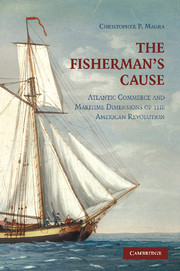3 - Fishermen
Published online by Cambridge University Press: 03 July 2009
Summary
It is known to be one of the most laborious employments; that those who carry it on get to themselves but a bare subsistence.
Joshua Burnham (1736–1791) was working as a skipper on the schooner Polly when the Revolutionary War began. His employers were Francis and John Choat, vessel-owning fish merchants in Ipswich, Massachusetts. Joshua and his younger brother Aaron were sons of Jeremiah Burnham, a middling farmer and part owner of a sawmill in the Cape Anne parish of Chebacco, near Gloucester, Massachusetts. Aaron fished commercially until he was forty years old, when his clothes and part of the vessel he was working on washed up on shore in 1782. This was a stark reminder for the Burnham family that those who went down to the sea in ships did not always return. For his part, Joshua worked as skipper and master of at least twelve vessels for various Massachusetts merchants between 1761 and 1790. Like so many other colonial maritime laborers, he died “sick from the West Indies.”
Eighteenth-century skippers such as Burnham were responsible for recruiting a crew, or “company,” for fishing expeditions. Vessel owners such as Thomas Gerry and the Choats, by contrast, may have been able to indirectly influence hiring decisions, but they did not personally scour ports for crews at this time. Structural changes in the commercial fishing industry in colonial America ensured that merchants did not have to perform this duty.
- Type
- Chapter
- Information
- The Fisherman's CauseAtlantic Commerce and Maritime Dimensions of the American Revolution, pp. 49 - 70Publisher: Cambridge University PressPrint publication year: 2009



